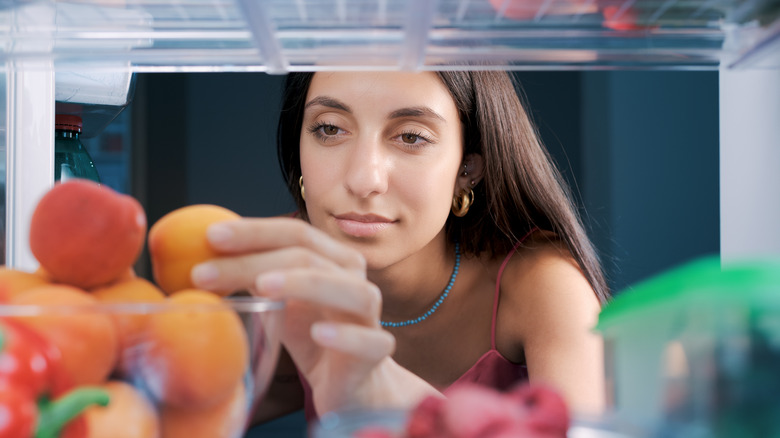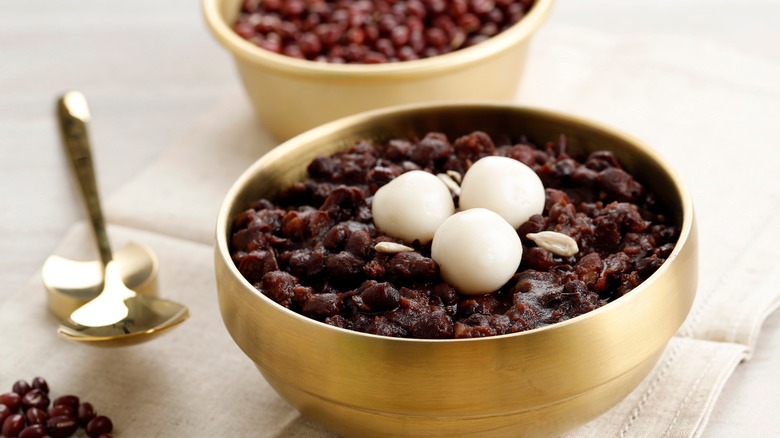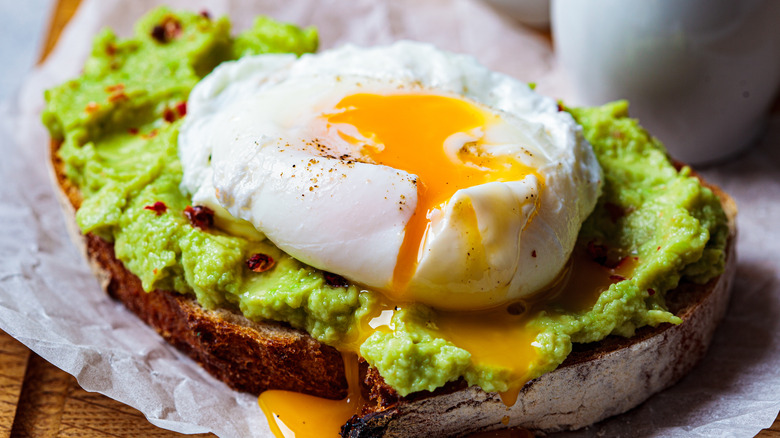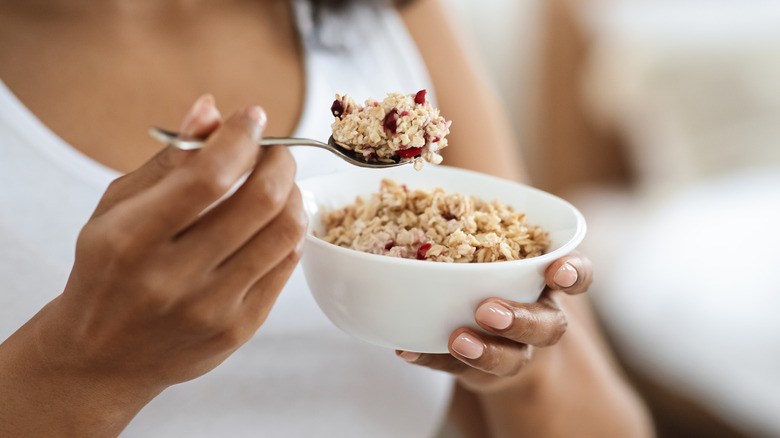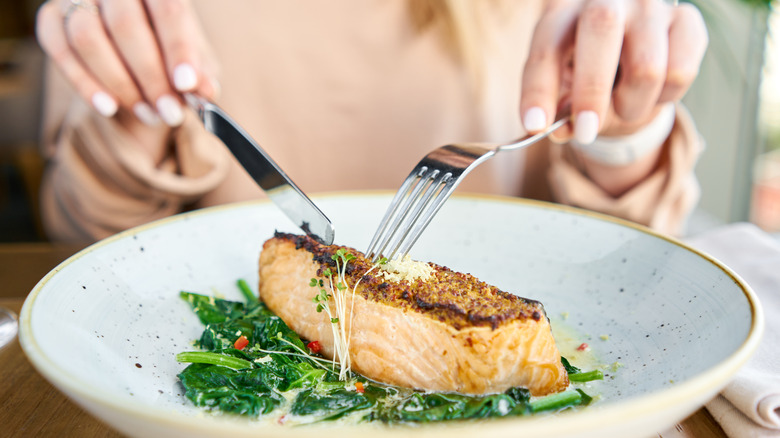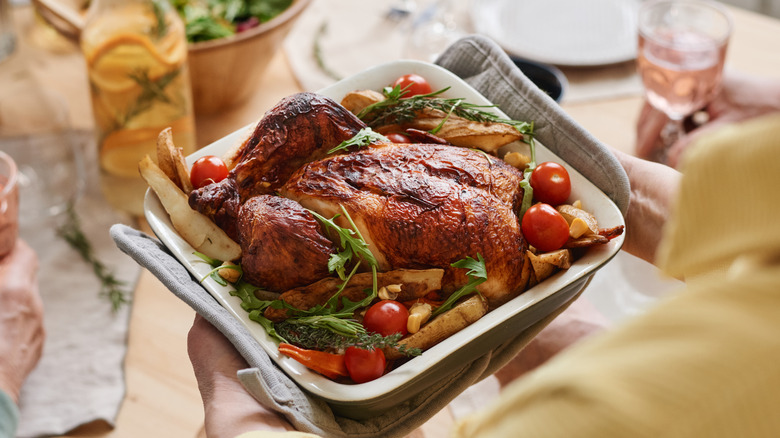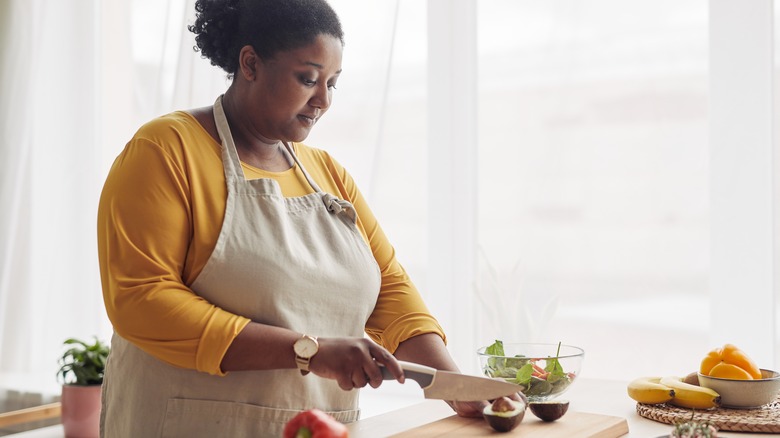What Foods Should You Eat If You're A Breastfeeding Mom?
Becoming a mother for the first time, or even the fifth, will certainly come with its challenges. From midnight feedings to changing diapers round the clock, and all while sleep-deprived, wondering if you're doing things correctly. There are lifestyle changes to be made, new techniques to master, and conflicting advice at every turn, so it's no wonder breastfeeding mothers are concerned about their babies getting all of the nutrients they need.
Not only does breastfeeding fill your baby's tummy, but it also protects your baby against illness and diseases, as antibodies can be passed through your breast milk. There are many other benefits to reap, and not just for your little one. According to the CDC, breastfeeding can protect you from developing diabetes, high blood pressure, and some cancers. It can also be a great way to introduce your baby to new tastes, as certain foods can alter the flavor of your breastmilk (via Mayo Clinic).
Breastfeeding moms will need about 500 more calories a day, but this isn't a free pass to eat more junk food (via NIH). The ultimate goal is to eat a well-rounded diet, because there's a long list of vitamins and minerals your newborn needs to grow. Since pregnancy, everything you have put into your body has had a direct impact on your baby, and this carries on through breastfeeding, so eating the right foods is important. If you're ready to become a super mom, add the following foods to your grocery list.
Vitamin-rich fruits
When breastfeeding, maximizing nutritious food intake is key to a healthy diet and healthy baby. Many moms may also be working on getting their bodies back to their pre-pregnancy size, and eating well can certainly help, so there are a number of reasons to opt for a well-rounded, nutritious diet. If you're a fruit salad or smoothie lover, you're in luck because you can get a surprising amount of nutrients from fruit.
There's an old rumor going around that breastfeeding moms shouldn't eat "gassy" foods or highly acidic fruits because of fears that the babies will react poorly, but a study conducted in 2017 concluded that there is no change in the pH of maternal plasma — in other words, you can chomp down on oranges, grapefruit, and pineapple all you like. Citrus fruits contain high levels of vitamins C, D, fiber, and folic acid, which are all incredibly beneficial nutrients to pass on to your baby.
Berries can provide antioxidant benefits and have vitamins A, K, potassium, and calcium, while apricots and other fruits like dates have immunity-boosting properties, promote gut health, and can even raise your levels of phytoestrogen (the chemicals that assist with regulating the lactation hormone in your body). If you're needing to boost your caloric intake, grab a banana because they're worth around 100 calories and contain tons of potassium. According to another 2017 study, your breastmilk can contain up to 375 milligrams of potassium, so upping your intake to 400 milligrams is ideal.
Leafy greens
Just like fruit, vegetable intake can really boost the nutrients your baby gets through your breast milk, as well as your ability to lactate. This is especially true for leafy, green vegetables. According to Penn State Extension, vegetables with a darker-green appearance are packed with the most nutrients. Vitamins A, C, and K can be found in many leafy greens, as well as iron, magnesium, calcium, and fiber. Try adding vegetables like spinach, kale, arugula, collard greens, and swiss chard to your daily meals.
Another concern among breastfeeding mothers is their ability to lactate. When your infant feeds every couple of hours, your milk supply might not have had a chance to catch up. That's why many women turn to galactagogues, which are ingestible products that boost lactation. They can include food, common cooking herbs, or supplements. Lactation supplements and the use of herbs are a debated topic, as more research still needs to be done on their safety and efficacy, but naturally occurring lactation aids in food can help. That's why it's great news that many leafy greens are considered galactagogues and can provide a healthy way to promote your milk production (via Healthline).
Some find it difficult to incorporate enough vegetables into their diets, especially when running around with a newborn. However, getting enough leafy greens can be as simple as preparing salads for lunch or dinner the night before, tossing a handful of spinach into your smoothie, or adding them to a quick stir fry.
Nuts and seeds
Nuts and seeds are a delicious and versatile snack, smoothie addition, or salad topper that offers healthy fats, iron, calcium, protein, and a variety of vitamins. They've been linked to numerous health benefits and can reduce your risk for heart disease or diabetes. One handful of nuts a day is a great way to incorporate these incredible health benefits into your diet (and your baby's). They're also known to promote a healthy weight as well, so those looking to get back to their pre-baby bodies will want to reach for almonds, cashews, pistachios, chia seeds, and pumpkin seeds (via Better Health).
There's a common worry about adverse reactions in breastfed babies due to the mother's ingestion of certain foods, especially in the instance of peanuts and other common allergies. Although your baby suffering from an allergic reaction is unlikely, food sensitivities are something to be mindful of. Be sure to keep an eye on your little one's fussiness after feeding, and if other symptoms occur, like rashes or breathing difficulties, take them to the hospital (via HealthyChildren.org).
Studies currently show zero link between breastfeeding mothers ability to protect their babies from developing food allergies as they get older by avoiding certain foods. However, breastfeeding for at least six months from birth has shown significantly fewer occurrences of children with allergies to food. So in short, nuts and seeds should be completely safe to eat while breastfeeding — just observe your newborn for any potential reactions.
Legumes
There are over 16,000 types of legumes that make up a wide variety of super-healthy foods, especially for moms and their babies. They're a great source of protein, calcium, iron, potassium, magnesium, amino acid, and fiber, and have many antioxidant benefits. While the nutritional makeup of legumes is great, they can also help manage your cholesterol and blood pressure while lowering your risk of developing heart disease and diabetes (via WebMD).
Legumes are also a beneficial supplement for breastfeeding mothers who don't consume dairy and/or meat, thanks to the high levels of protein, calcium, and iron they provide. The myth that you shouldn't eat foods that cause gas while breastfeeding has been disproven, so you can help yourself to delicious and nutritious foods like lentils, kidney beans, black beans, peas, chickpeas, and peanuts.
Many of these legumes (as well as others) are classed as galactagogues, helping increase your milk supply and aiding in sufficient nourishment for your little one. Your immune system will thank you as well since legumes support the healthy bacteria in your gut — and a healthy mom is one who is able to feed her baby best.
Milk, cheese, and yogurt
Unless you're lactose-intolerant or vegan, you need to be getting your daily dose of dairy. When you're nursing, your calcium needs increase to at least 1,300 milligrams per day (roughly the equivalent of four cups of milk). This is because calcium supports bone health and growth in your little one. Dairy products like milk, hard cheese, and greek yogurt are full of calcium, vitamin D — the sunshine vitamin — and protein and hold significance in a diverse, well-rounded diet (via UCSF Health). Some moms were probably told to avoid unpasteurized products while they were pregnant, but this is no longer a restriction for breastfeeding mothers, and virtually any dairy product should be deemed safe when consumed in moderation.
While dairy products like milk, cheese, and yogurt are some of the best sources of calcium, it's unfortunately not an option for everyone. If you're a nursing mom that practices a dairy-free diet, you can also have your nutritional needs met through nuts, tofu, beans, soy products, and calcium-fortified drinks like orange juice or milk alternatives (via Moreland Ob-Gyn).
Another reason you may opt for a dairy-free diet is if you've noticed your baby has a sensitivity to cow milk. If your newborn is especially fussy after feeding and you consume dairy products, it might be worth a trip to the doctor. If they recommend you forgo dairy while you're nursing, remember that you will need to replace the calories and nutrients dairy would have filled.
Eggs
Probably one of the most versatile ingredients around, eggs are a strong contender for the best foods to eat when you're breastfeeding. After you have your baby, your need for iodine and choline increases. More specifically, you need about 290 micrograms of choline and 550 milligrams of choline per day to efficiently nourish your child and support their growth — and because your baby gets this nutrient from your breast milk, you can be left depleted if you don't consume enough. Both choline and iodine can be found in dairy and eggs, so whipping up an omelet or scramble can be a great way to start your day (via CDC).
Eggs are also a great source of folate, selenium, vitamin D, and omega-3 fatty acids, which have incredible benefits for your body and your baby's. In fact, several studies have been done on the benefits of breastfeeding mothers who eat eggs. A 2016 study linked an improvement in a baby's immune system to the fact that their breastfeeding mothers ate eggs.
A 2018 study found that mothers who eat eggs while breastfeeding can actually protect their children from developing egg allergies in the future. It's understood that when babies are exposed to potential food allergens in the womb or while breastfed, they may be able to build a tolerance and avoid an allergy altogether. Aside from the immense nutritional density eggs have, these results alone are a stellar reason to add eggs to your shopping list.
Whole grains
The list of positives whole grains bring to your diet is seemingly endless. For those who can tolerate gluten, wheat bread, pasta, quinoa, and brown rice are great additions to your meals that provide complex carbs (which keep you full for longer), are high in fiber, iron, and vitamin B, and can increase your milk supply. Even after you finish breastfeeding, maintaining your intake of whole grains is beneficial as it can also help regulate your blood sugar and is a favorite for those trying to maintain a healthy weight (via Sanford Health).
Another food you should be eating if you're a breastfeeding mom is oats — especially if you suffer from celiac disease, because it contains no gluten. Aside from the host of nutritional benefits they contain (protein, manganese, zinc, calcium, and vitamin B), they also act as a galactagogue. For those struggling with postpartum depression, oats have also been linked to boosting your mood and relieving symptoms of stress, anxiety, depression, and tiredness (via Verywell Family). This is a delicious ingredient you can enjoy in the form of oatmeal, bread, granola bars, muffins, and many other nutritious snacks.
If you're not yet making oats or other whole grains a part of your daily diet, it's time to start. Do keep in mind that some of these products contain high fructose corn syrup and other processed ingredients. If you're unsure, read the label before you take a bite — or you can always make your own healthy treats.
Fish and seafood low in mercury
Who doesn't love pan-fried salmon, fresh calamari, or chilled crab legs? Not only are these foods delicious, but they're highly recommended for breastfeeding mothers to incorporate into their diets, giving you all the more reason to splurge a little. Fish and other seafood are great sources of iron, zinc, vitamin B12, vitamin D, and choline, and they are high in protein and omega-3 fatty acids, which support your baby's development. Unfortunately, this encouragement comes with a caveat — only some seafood is deemed safe for pregnant and breastfeeding mothers.
Just a few months ago, the FDA updated their advice guide on eating fish. They emphasized the risks of ingesting fish that are deemed to carry high levels of mercury, which include swordfish, shark, marlin, and fresh tuna. These fish should be avoided when pregnant and breastfeeding, as mercury has been linked to having ill effects on the nervous system and brain of babies. However, this still leaves you with plenty of foods to choose from.
Opt for anchovies, clams, cod, haddock, lobster, salmon, scallops, tilapia, or canned light tuna for seafood that contains low levels of mercury. The suggested limit for breastfeeding moms is between eight and 12 ounces of seafood per week, with a daily limit of four ounces. This means you can safely have fish three times a week if you like, allowing you and your baby to safely soak up all of the nutritious value seafood contains.
Lean meats and poultry
When you've used up your weekly fish and seafood allowance, eating lean meats and poultry can be another great way to improve your iron and protein intake. When you're breastfeeding, you need around six ounces of protein a day, as it's essential for producing milk and supporting your baby's growth. Additionally, iron is a needed mineral that maintains your energy levels, which will be more important now than ever (via HealthyChildren.org).
Foods like chicken and turkey are highly recommended as they're limited in saturated fats but contain plenty of protein, and dark meat contains a lot of iron. While red meat has more saturated fats, it's an excellent source of iron and is completely fine to eat in moderation. If you're concerned about fat content, you can always opt for leaner cuts of meat. It should go without saying, but it's important always to ensure meat is cooked properly to avoid sickness.
Don't worry, we haven't forgotten about all of you vegetarians and vegans out there. You can still nourish your baby just as well as meat-eaters, but you'll need to be extra vigilant about the vitamins and minerals you're getting — and more importantly, the ones you're not. If you've been veggie for a while, you probably already know the tips to up your protein and iron levels; eat tofu, lots of greens, beans, grains, and nuts. Some use supplements but consult your doctor beforehand to be sure it's safe for your baby (via Verywell Family).
Healthy fats
You might have been told throughout your life that fat is bad or unhealthy, but there's a huge array of foods out there that contain the good kind of fat, also known as unsaturated fats. These are so important to maintaining a well-rounded diet, as they can help you absorb vitamins, produce hormones, and boost your immune system. They're also crucial for your baby's immune system, eye development, and brain growth (via American Pregnancy Association).
Healthy fats can be found in omega-3 and omega-6 fatty acids, also known as eicosapentaenoic acid (EPA) and docosahexaenoic acid (DHA). The best way to get these into your system and pass them on to your baby is through coconut milk, nuts, seeds, plant-based oils, fish with low levels of mercury, eggs, and avocados. The key to a well-rounded diet is eating in moderation. Just because avocados are deemed healthy doesn't mean you should eat several a day.
Try also to limit or avoid trans fats or saturated fats, as these are the unhealthy fats you and your baby don't need. When you're breastfeeding, the entirety of your baby's diet is dependent on yours, so avoiding high fructose corn syrup and overly processed foods is best, as they tend to contain little to no nutritional value, empty calories, and chemicals that bring no benefits to your newborn baby's body (via SF Gate). All you can do is your best, so don't be hard on yourself if you indulge in the occasional unhealthy fat.

